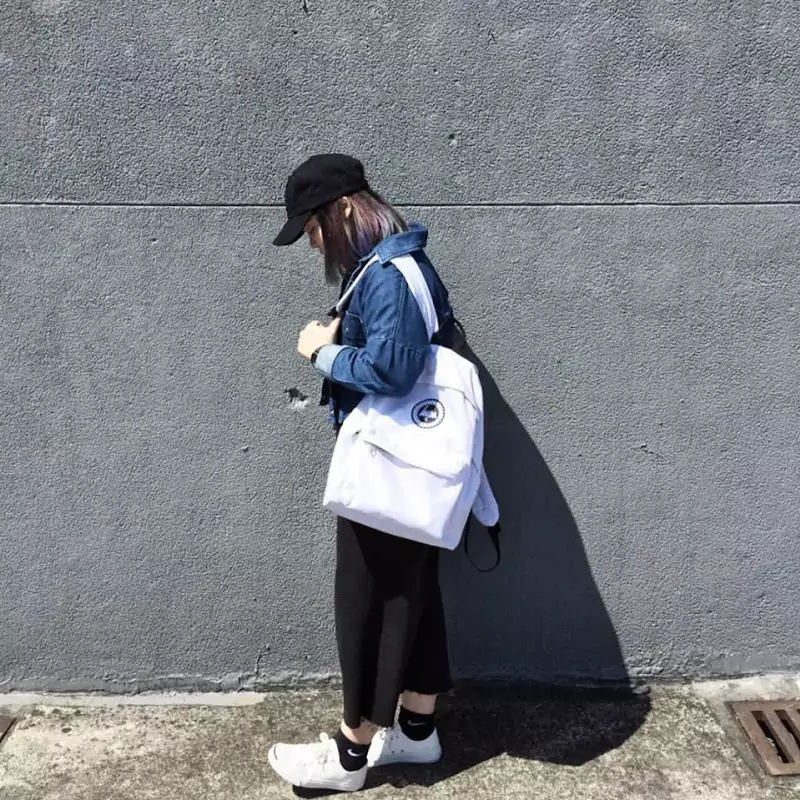雖然這篇找不到網頁鄉民發文沒有被收入到精華區:在找不到網頁這個話題中,我們另外找到其它相關的精選爆讚文章
在 找不到網頁產品中有28篇Facebook貼文,粉絲數超過566萬的網紅ETtoday新聞雲,也在其Facebook貼文中提到, 這網址根本找不到網頁啊😅😅(#瑪姬麻吉) ↗下載ETtoday新聞雲App,掌握大小事 http://goo.gl/sJmzjp...
同時也有5部Youtube影片,追蹤數超過4萬的網紅It’s Sabrina,也在其Youtube影片中提到,我的近期最愛/愛用~~~ 沒想到發這支片的時候已經8000訂閱ㄌ🌼 謝謝大家~~ 其實拍這支影片ㄉ時候很開心因為都是我喜歡的東西所以一直劈裡啪啦講一大堆🤣 BTW,recent的發音是ˈrēs(ə)nt不是rēˈs(ə)nt,英文退步大家請見諒(忽略).... 然後細心的人可能會發現字幕有的比較粗...
「找不到網頁」的推薦目錄
- 關於找不到網頁 在 JobUs職場小旅行 Instagram 的最佳貼文
- 關於找不到網頁 在 物理&日常迷因 Instagram 的最佳解答
- 關於找不到網頁 在 棉花糖柴柴。廢貓阿米 Instagram 的精選貼文
- 關於找不到網頁 在 ETtoday新聞雲 Facebook 的最讚貼文
- 關於找不到網頁 在 TVBS 地球黃金線 Facebook 的最佳解答
- 關於找不到網頁 在 沃草 Watchout Facebook 的最佳貼文
- 關於找不到網頁 在 It’s Sabrina Youtube 的最讚貼文
- 關於找不到網頁 在 Miss挑‧挑剔小姐 Youtube 的最佳解答
- 關於找不到網頁 在 木昜 Youtube 的最讚貼文
找不到網頁 在 JobUs職場小旅行 Instagram 的最佳貼文
2021-07-06 07:11:20
我們在找尋資料或要做報告時,總會從網路上下手,複製一些線上的文獻資料與圖片,但有時候在未來要翻找的時候便找不到網頁了😅!而就算只是隨意瀏覽,有時候看到自己想要保存的內容,使用書籤一下子就被淹沒了一點也不好找到😢,這樣該怎麼辦呢? 因此我們今天就是要推薦給大家6款一鍵擷取網頁資訊的插件,教大家除...
找不到網頁 在 物理&日常迷因 Instagram 的最佳解答
2020-09-07 20:37:46
這些科學梗潮T😎 來自泛科市集官網中的泛科穿幫館 如果自己找不到網頁的 網址會附在首頁與限動 😳結帳輸入折扣碼「phymeme50」 可折扣50元 (不含童裝) 謝謝 @pansci 的電商合作 讓理工宅宅們的衣服更多元 看不夠可以去官網看更多嘿嘿 男女版型都有嘿嘿嘿 #科學 #衣著 #黑貓 ...
找不到網頁 在 棉花糖柴柴。廢貓阿米 Instagram 的精選貼文
2020-05-01 06:47:15
[error error error...] 開學第二堂微積分 腦中已經開始找不到網頁了 404 NOT FOUND 404 NOT FOUND 404 NOT FOUND 。。。 #厭世#廢物日常 #廢貓阿米#柴犬 #狗狗 #毛小孩 #柴包子#嘴邊肉 #柴柴#棉花糖 #棉花糖柴柴 #棉花糖柴犬...
-
找不到網頁 在 It’s Sabrina Youtube 的最讚貼文
2020-08-02 16:00:12我的近期最愛/愛用~~~
沒想到發這支片的時候已經8000訂閱ㄌ🌼
謝謝大家~~
其實拍這支影片ㄉ時候很開心因為都是我喜歡的東西所以一直劈裡啪啦講一大堆🤣
BTW,recent的發音是ˈrēs(ə)nt不是rēˈs(ə)nt,英文退步大家請見諒(忽略)....
然後細心的人可能會發現字幕有的比較粗有的比較細,那個我試了好幾次輸出後還是一樣,所以我可能也無法嗚嗚
最後!裡面的東西都是我真心推的(歡迎大家入坑)🥺
第一次拍這系列的影片,希望大家喜歡~~💖
✨Instagram:sabriiiiina.aa(i*5)
(Follow follow meeeee🤩)
💌email:[email protected]
——————————————————————
▷Camera:Canon m50
▷編輯軟體:final cut pro X
▷Information:
Ikea水壺
https://www.ikea.com.tw/zh/products/storing/food-containers/uppladda-art-10415344
AirPods Pro 熊熊殼
https://shopee.tw/product/3805263/7510202138?smtt=0.0.9
嚕嚕米被杯套
https://www.iam-moomin.tw/product-tag/飲料提袋/
。零食
Fox’s綜合水果風味水晶糖(找不到網頁嗚嗚)
義美捲心酥
https://www.costco.com.tw/Food/Snacks/Nuts-Snacks/I-Mei-Wafer-Roll-12CT-882G/p/104513
Costco維也納奶油餐包(官網也消失⋯嗚)
。保養品
品木宣言DR. WEIL青春無敵健康光潤機能水(靈芝水)
https://www.origins.com.tw/product/15347/52006/treat/dr-weil/dr-andrew-weil-for-origins#/sku/84868
Target Pro 全效重點修護水潤亮膚精華乳 30ml
https://www.watsons.com.tw/target-pro-%E5%85%A8%E6%95%88%E9%87%8D%E9%BB%9E%E4%BF%AE%E8%AD%B7%E6%B0%B4%E6%BD%A4%E4%BA%AE%E8%86%9A%E7%B2%BE%E8%8F%AF%E4%B9%B3-30ml/p/BP_174822?gclid=Cj0KCQjwpZT5BRCdARIsAGEX0zn4YpUAM3Jjh9swa4zWg-xC-gKfxqGqWS0Hts9xUhoZCrkt6-Rail0aAm6qEALw_wcB&gclsrc=aw.ds
無印良品 攜帶睫毛夾
https://www.muji.com/tw/products/cmdty/detail/4547315844449
。Netflix movie
The kissing booth 1&2
。K-drama
我們愛過嗎?(Was it love?)
。韓國選秀節目
I-land
。Songs
LEE HI-HOLO
Hwasa-Maria
SOMI-what you waiting for ?
◎Music Credit
Music by Visceral Beats - Best Friends Forever - https://thmatc.co/?l=85D141D3 -
找不到網頁 在 Miss挑‧挑剔小姐 Youtube 的最佳解答
2018-01-07 18:30:00ღ挑挑的店家資訊在這邊☞
FB: FeiFeiBeauty‧挑剔小姐美妝選物
https://www.facebook.com/feifeicosmetic123/
(店家資訊移到最高是因為太多人私訊問我了QQ)
ღAfterfilm☞
週末就輕鬆地看個不用動腦的開箱影片吧!!!!
詳細的產品介紹跟實穿實拍會在分享下一次的淘寶推薦店家影片中
可是應該不會每一樣都介紹到
所以如果有特別想看哪一樣的朋友記得要留言告訴我喔(手比愛心
ღAbout product☞
1.歐美大眼鏡:https://goo.gl/Hsx9wL
2.毛毛球帽:https://goo.gl/mqCbtU
3.加絨毛毛襪:https://goo.gl/eCyYPN
4.毛毛貝蕾帽:已找不到網頁QQ
5.純黑貝雷帽:https://goo.gl/bTvMs8
6.加絨內搭褲:https://goo.gl/K565LC
7.黑色半高領針織衫:https://goo.gl/jzLAAF
8.白色麻花毛衣:https://goo.gl/UeeBXm
9.灰色西裝寬褲:https://goo.gl/SBTLmt
10.燕麥色打底針織衫:https://goo.gl/yfxPBc
11.襪靴:https://goo.gl/CqoXdb
ღFollow me☞
Facebook☛ https://goo.gl/rHdkfP
Instagram☛ feifeibeauty1398
✉✍ feifeibeauty1398@gmail.com
ღAbout me☞
敏感乾性酒糟粉刺痘痘肌(好慘)
155cm穿搭
小小美妝店闆娘
喜歡清新自然的日韓妝感 -
找不到網頁 在 木昜 Youtube 的最讚貼文
2017-07-02 20:00:03↓Click For More Info↓
THIS YOUTUBE VIDEO ABOUT "我的手帳怎麼寫?初學者該買哪種本子?"
(問問題之前,先打開看看有沒有答案吧!)
-
今天要跟你們分享的是我的手帳怎麼寫?初學者該買哪種本子?
希望大家喜歡這個影片
p.s.影片有英文用法錯誤請見諒
and
如果覺得影片不錯也請幫我按個喜歡
有任何問題或想知道的 都很歡迎在下面留言給我唷!
INSTAGRAM/SPOTIFY
Instagram|@am_____ber
SPOTIFY |AMBERS MUSIC TIME https://goo.gl/Pz2Ixn
_______________________________________________________
-初階手帳本推薦-
1.ICONIC A6迷你週計畫本 ↓以下款式
https://goo.gl/SQVRrv
https://goo.gl/o5BqMR
https://goo.gl/dJFEiT
https://goo.gl/Lkt3kM
-中階手帳本推薦-
1.星巴克手帳本(找不到網頁)
2.無印良品手帳本 https://goo.gl/JS5MPe
*初中階推薦文具手帳網頁https://www.pinkoi.com/store/dessin
-高階手帳本推薦-
1.Leuchtturm1917 A5 Dotted https://goo.gl/KwGYnN
-日付創作者-
https://www.instagram.com/carolmeoww/
https://www.instagram.com/conniegg316/
https://www.instagram.com/yushao.design/
https://www.instagram.com/bonnnnnieview/
https://www.instagram.com/sunset_stationery/
________________________________________________________
?MUSIC?
Keith Urban - The Fighter ft. Carrie Underwood https://goo.gl/cVGrWF
?常問問題?
1.剪接編輯軟體:Adobe Premiere CS5/CS6
2.照片編輯軟體:Adobe Photoshop CS5/CS6
3.影片開頭結尾等圖片都在哪裡找:Pinterest、tumblr、google (png檔)
4.Instagram影片怎麼下載的:
↓教學在此↓
https://goo.gl/k3P2n8 (Andiord)
https://goo.gl/YpgQSf (IOS)
5.相機使用哪一台:CANON G7X
6.光療指甲哪裡做:
店名:愛美甲 i Mega Nail Cafe
美甲師:Polly
instagram:@pingsnailart
LINE:yanping0628
地址:新北市板橋區宮口街6號2樓
(店面採取預約制)
e mail : [email protected]
Age:21
FTC: This video is NOT sponsored.







找不到網頁 在 ETtoday新聞雲 Facebook 的最讚貼文
這網址根本找不到網頁啊😅😅(#瑪姬麻吉)
↗下載ETtoday新聞雲App,掌握大小事
http://goo.gl/sJmzjp
找不到網頁 在 TVBS 地球黃金線 Facebook 的最佳解答
看到這個就想找威力!!!!🔎🔎
(強迫症發作ing😆😆😆)
找不到網頁 在 沃草 Watchout Facebook 的最佳貼文
#獨家 世界衛生組織將台灣問題相關聲明稿下架!
世界衛生組織(WHO)在台灣時間今(6)日凌晨以 "How the World Health Organization works with all people, everywhere" 為題發了一篇聲明稿,試圖為排除台灣參與 WHO 辯解。不過這篇聲明卻在不到 24 小時內就被 WHO 網站下架,直至晚間6時30分仍呈現「找不到網頁」(This page cannot be found),《沃草》透過世衛網站暫存紀錄,獨家為大家揭露該篇聲明內容。
聲明中,WHO仍稱與台灣相關的事務為「中國台灣事務」( Taiwan, China issues),針對全球的種種批評,WHO 仍稱之為誤解(misunderstandings),並聲稱是有些人將「技術性的維護全球公共健康任務」與「決定 WHO 會員資格的權限」混淆,似乎打算以此來回應國際要求讓台灣加入 WHO 的呼聲。
聲明中多處重申 WHO 在 3 月 29 日公布的聲明(https://waa.tw/Qsu21N),認為 WHO 與台灣設有聯絡點、台灣專家曾參與 WHO 會議等,並表示台灣參與世界衛生大會的觀察員資格是在一次次的會員國投票中遭到否決,以及提起讓中華人民共和國取代中華民國聯合國席位的聯合國 2758 決議文,表示世界衛生大會遵循此決議及其中的一中原則。
似乎是為回應全球對 WHO 應對流行病能力的質疑,WHO 在聲明中表示「有些人可能認為 WHO 成員組成影響我們維護世界安全的能力,但更重要的是要了解我們的治理方式和實踐方式。」
暫存檔網址:https://waa.tw/dohkIm
聲明截圖:https://drive.google.com/file/d/1VP-KMgP4wb6Oy8jQkOjoSu-DWGS3Xqkb/view
原新聞稿網址:https://waa.tw/lFKd8M
(以下為世界衛生組織聲明原文)
標題:Update: How the World Health Organization works with all people, everywhere
發表時間:5 April 2020 Statement
內文:
In recent months we have seen misunderstandings in social media and the news media about how WHO manages global public health issues. In particular, there are a lot of questions about Taiwan, China issues. Some people are confusing WHO’s technical global public health mandate, with the mandate of countries to determine WHO’s membership. Countries decide this. The WHO Secretariat focuses on keeping the world safe.
WHO works to promote the health of all people, everywhere. Indeed, one of our overarching goals is Universal Health Coverage. #healthforall. We are an organization with a staff of physicians, scientists, researchers and public health experts who are committed to serving all people regardless of nationality, race, ethnicity, religion, gender.
This includes the people of Taiwan. We serve them through regular interactions with their experts and authorities on vital public health issues. This has been the case over many years, including during the COVID-19 pandemic.
It is understandable that some people might think that the composition of WHO’s membership affects our ability to keep the world safe. But it is important to understand both how we are governed and how we operate in practice.
WHO is part of the United Nations, whose membership is the mandate of countries. In 1971, countries of the world participating in the United Nations General Assembly recognized the People’s Republic of China as “the only legitimate representative of China,” in effect, a one-China policy. That is contained in UNGA Resolution 2758. In 1972, the World Health Assembly decided in WHA Resolution 25.1 to follow that.
Every year, members have a chance to discuss important proposals during the World Health Assembly, where rules and policies governing WHO are decided. For example, at different times, some countries have proposed giving Taiwan’s authorities a special status – that of observing the annual World Health Assembly.
There have been 14 times over the last 22 years (1997-2006; and in 2008, 2017, 2018, 2019) when countries discussed whether a delegation from Taiwan could attend the World Health Assembly as an observer. Each time the countries decided against it by consensus – except in 1997 and 2004 when there were votes: (by 128 votes to 19 in 1997; and by 133 votes to 25 in 2004). In 2007, the issue wasn’t observer status, but membership, and countries decided against considering that by a vote of 148 to 17.
There have been occasions when it was clear that there was general support among WHO countries for Taiwan to take an observer seat at the World Health Assembly. Between 2009 and 2016, it did so under the name “Chinese Taipei.”
But having a seat at the WHA, or not having a seat at the WHA, does not affect, in any way, whether an area or population benefits from WHO expertise and guidance. WHO helps all people, everywhere.
WHO and Taiwan’s health experts interact throughout the year on vital public health and scientific issues, according to well-established arrangements.
During the current COVID-19 pandemic, interactions have been stepped up, both through existing channels and new ones as well.
Here are examples of WHO-Taiwan interactions around the coronavirus pandemic:
-- There is an established International Health Regulations (IHR) Point of Contact (POC) for Taiwan. Taiwan’s POC receives IHR (2005) communications, provides IHR information updates from Taiwan directly to WHO Headquarters, and has access to the IHR Event Information Site (EIS) system. The EIS system is a password-protected database and information exchange platform supporting the IHR. It is the well-established platform for all IHR communications, back and forth, between WHO and IHR contacts.
-- Health experts from Taiwan participate in two of the key WHO networks set up in January 2020 to support WHO work in the global COVID-19 response. Three experts from Taiwan are part of the WHO Infection Prevention and Control Network: two are part of the WHO Clinical Network. Every week, they join some 60 to 80 other experts from around the globe through a WHO-hosted teleconference, working to advance our knowledge and guidance in this response.
-- Two public health experts from Taiwan participated in the Global Research and Innovation Forum organized by WHO on 11-12 February 2020. They took part, alongside other world scientists, in considering critical research questions and in finding ways to work together to advance the response.
-- Taiwan’s Field Epidemiology Training Program is a member of the Training Programs in Epidemiology and Public Health Interventions Network (also known as “TEPHINET”). WHO shares Global Outbreak Alert and Response Network alerts and requests for assistance with TEPHINET, and those messages are cascaded to the TEPHINET members.
-- WHO, through its technical lead, has directly briefed health authorities from Taiwan and has offered again.
--Taiwan’s health experts and authorities have open access to developments, guidance and other materials through the WHO’s website (www.who.int) and other digital platforms.
--They can access the www.OpenWHO.org platform, which hosts open online courses for decisionmakers and responders around the world. During the COVID-19 pandemic, OpenWHO usage has reached more than 1 million.
--WHO has a designated contact point with their office in Geneva. Through this channel, general questions are handled and when technical concerns arise, WHO technical responses are coordinated.
--WHO also interacts with Taiwan’s health authorities through the European Centre for Disease Prevention and Control.
Importantly, the COVID-19 caseload in Taiwan is low relative to population. We continue to follow developments closely, and WHO is taking lessons learned from all areas.
Interactions with Taiwan during the response to the pandemic is not exceptional. Here are some examples of regular interactions with Taiwan’s health authorities and WHO, over many years, through well-established arrangements, and across many different global health concerns:
Over the course of 2019, Taiwan’s experts were invited to attend 9 WHO technical meetings. They attended 8 of these meetings, contributing to WHO expert processes on issues including immunization, drug-resistant TB, assistive technologies, vaccine safety and SDG targets on NCDs and Mental Health. Prior to the Covid-19 emergency, work was underway for more expert participation from Taiwan in 2020.
On influenza, Taiwan vaccine manufacturer Adimmune contributes to the WHO Pandemic Influenza Preparedness Framework (PIP Framework) and preparations are underway for concluding an agreement between WHO and Adimmune under the PIP Framework for pandemic influenza vaccine products;
In the fight against cancer, experts from Taiwan have contributed to key publications issued by the WHO International Agency for Research on Cancer;
In support of the International Health Regulations, an expert from Taiwan has been appointed to the IHR Expert Roster; and
On a range of other issues, from WHO pre-qualification practices for pharmaceutical manufacturers to malaria, there are exchanges with WHO on practical and technical issues.
It is fair to say that the contribution of Taiwan’s health experts to WHO, and their interactions with us, are well-developed and broad-based. And these interactions add value to the work of WHO and to global health.